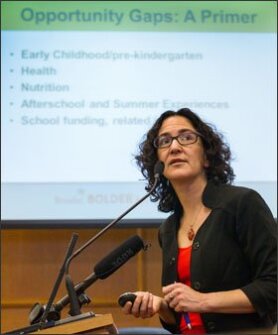Policymakers around the country are embroiled in debates over private school vouchers, with school choice-related legislation bidding for attention in multiple statehouses, as well as in the U.S. Senate.
Proposals to create programs that provide public funds for private school tuition have been introduced in Alaska, Indiana, Oklahoma, Tennessee, and Wisconsin. And in North Carolina, a lawsuit aimed at curtailing a new voucher program has been gaining support from school districts.
And last week, U.S. Sens. Lamar Alexander (R-Tenn.) and Tim Scott (R-S.C.) unveiled separate bills that would free up federal education funds to follow students to the schools of their choice.
Republican Efforts Cited

This flood of private school-choice legislation is part of a broader trend at the state level since the 2010 elections, when many Republicans gained control of state legislatures, said Josh Cunningham, a policy specialist who tracks the issue for the National Conference of State Legislatures.
“Since the start of 2011, 41 states have considered [private] school choice,” said Mr. Cunningham, who said that at least 19 states would be considering such legislation this year.
Since 2011, new school choice programs have been created in 14 states.
At the federal level, Sen. Alexander’s proposal would consolidate funding from 80 federal education programs (excluding the free- and reduced-price lunch program and funding for students with special needs) into one lump sum of $24 billion that would then be distributed to states as $2,100 scholarships that would follow low-income children to schools of their choice. States would be in charge of setting their own rules around how the money is distributed, said Sen. Alexander, such as whether the funds could be used at private schools, and if so, which private schools could participate.
Sen. Scott’s proposal would make funds from the Individuals with Disabilities Education Act more portable for students with special needs to apply to schools of their choice. It would also create a pilot voucher program for students on military bases and expand the voucher program in the nation’s capital.
Meanwhile, in Alaska, school choice was touted by Gov. Sean Parnell, a Republican, in his annual State of the State speech on Jan. 22. He encouraged lawmakers to pass Senate Joint Resolution 9, which would amend the state’s constitution, paving the way for the creation of a voucher program that would allow eligible students to use public funds for private school tuition.
Other Variations
In Indiana, Gov. Mike Pence, a Republican, also called in his State of the State speech for vouchers for pre-K students and commended the state’s House of Representatives on the passage of a bill that would create such a program.
But his call was followed a few days later by a new report by the Department of Education which shows that following last year’s loosening of eligibility requirements for the state’s existing voucher program. Begun in 2011, the program has more than doubled in size, now serving 19,800 students. The report also found that about 40 percent of those students receiving vouchers had never previously attended a public school.
In Oklahoma, Republican Reps. Jason Nelson and Tom Newell have introduced legislation that would create the second education savings account program in the nation, setting aside funds for low-income students to put towards education-related expenses such as private school tuition, tutoring services, textbooks, or college tuition. Only Arizona currently has such a program in place, which serves 731 students in the 2013-14 school year.
Republican senators in Tennessee have proposed legislation that would create a voucher program for low-income students in the bottom 10 percent of failing schools in the state.
Gov. Bill Haslam, a Republican, has expressed strong support for vouchers, but his proposal would restrict vouchers to low-income students in the bottom 5 percent of failing schools—effectively limiting the program to students in Memphis and Nashville. Gov. Haslam proposed voucher legislation during last year’s session but it was taken out of his budget bill when Republicans in the Senate attempted to scale up the program.
Legality Questioned
Meanwhile, a bill in Wisconsin would expand school choice to a certain segment of students with disabilities whose requests to enroll in a public school outside of their home district were denied. The bill, introduced by Republican Sens. Leah Vukmir and Alberta Darling, would allow those students to obtain a scholarship that they could use to attend a private, public, or charter school of their choice.
Another bill that would have turned regular public schools receiving failing grades from the state into charter schools and prohibited low-performing voucher schools from accepting new voucher-funded students may be shelved until next year. A scheduled vote was cancelled last week when it failed to garner enough political support.
But while voucher programs have gained steam in many states’ legislatures, the legality and constitutionality of such programs are frequently challenged.
For example, school districts in North Carolina are joining on to a lawsuit filed by the North Carolina School Boards Association that challenges the constitutionality of a newly passed voucher program in the state that would allow low-income students to receive $4,200 in scholarship funds to their school of choice, including private schools.
“By diverting funding from the public schools, vouchers have the potential to significantly damage individual school systems, particularly in smaller districts,” said Shearra Miller, the president of the NCSBA in a statement. “The voucher program does not ensure that private schools that receive public funding will adhere to our constitution’s promise that students will have the opportunity to receive a sound basic education and will not face discrimination.”
To date, 40 school districts have signed on to the lawsuit, said Robert F. Orr, the attorney for the case.
North Carolina Senate President Pro Tempore Phil Berger and House Speaker Thom Tillis, both Republicans, condemned the lawsuit, calling it an attempt by “left-wing interest groups” to “trap underprivileged and disabled children in low-performing schools.”


